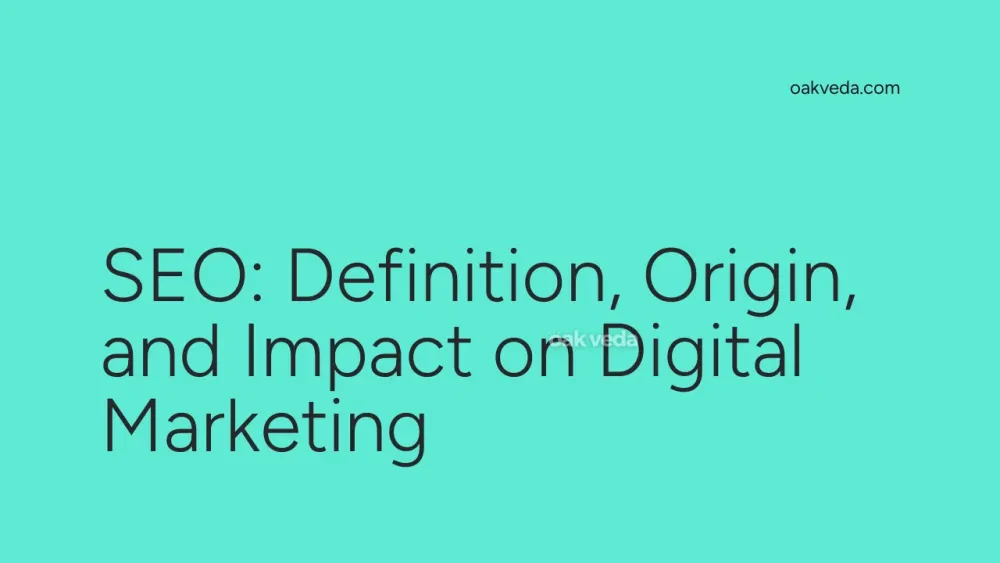
What is SEO?
SEO, or Search Engine Optimization, is the practice of optimizing websites and online content to improve their visibility and ranking in search engine results pages (SERPs). The primary goal of SEO is to increase organic (non-paid) traffic to a website by making it more attractive to search engines like Google, Bing, and Yahoo.
Origin and Development of SEO
The concept of SEO emerged in the mid-1990s as search engines began to play a crucial role in how people accessed information on the internet. Initially, SEO focused on simple tactics like keyword stuffing and link farming. However, as search engines became more sophisticated, SEO evolved into a complex discipline that encompasses technical, on-page, and off-page optimization strategies.
How SEO Works
SEO works by aligning website content and structure with search engine algorithms. These algorithms use hundreds of ranking factors to determine the relevance and quality of a website for specific search queries. Key components of SEO include:
- On-page optimization: Optimizing content, meta tags, headings, and internal linking
- Technical SEO: Improving site speed, mobile-friendliness, and crawlability
- Off-page optimization: Building high-quality backlinks and managing online reputation
- Content creation: Developing valuable, relevant content that addresses user intent
- User experience: Enhancing site navigation, design, and overall usability
Types of SEO
SEO can be categorized into several types:
- White Hat SEO: Ethical practices that adhere to search engine guidelines
- Black Hat SEO: Manipulative tactics that violate search engine rules
- On-page SEO: Optimizing individual web pages for better rankings
- Off-page SEO: Improving a site's authority through external factors
- Technical SEO: Enhancing a website's backend structure and performance
- Local SEO: Optimizing for location-based searches
Popular Examples of SEO Success
Many companies have achieved significant growth through effective SEO strategies:
- Airbnb: Optimized their website for long-tail keywords, resulting in increased organic traffic and bookings
- Etsy: Implemented a comprehensive SEO strategy, leading to a 50% increase in organic search traffic
- Moz: Built their brand and business by creating high-quality SEO content and tools
Impact of SEO on Digital Marketing Culture
SEO has revolutionized digital marketing by:
- Shifting focus from interruption-based advertising to inbound marketing
- Emphasizing the importance of high-quality, user-centric content
- Encouraging businesses to prioritize user experience and website performance
- Driving the development of data-driven marketing strategies
Controversies and Debates Surrounding SEO
While SEO is widely accepted as a crucial digital marketing practice, it's not without controversies:
- Algorithm updates: Sudden changes in search engine algorithms can dramatically impact website rankings
- Ethical concerns: The line between white hat and black hat SEO tactics is sometimes blurred
- SEO vs. paid advertising: Debates over the effectiveness and ROI of organic SEO compared to paid search ads
How Brands and Influencers Use SEO
Brands and influencers leverage SEO to:
- Increase online visibility and brand awareness
- Drive targeted traffic to their websites
- Establish authority and credibility in their niche
- Improve user experience and engagement
- Generate leads and conversions
Future Trends Related to SEO
The future of SEO is likely to be shaped by:
- AI and machine learning: More sophisticated algorithms will better understand user intent
- Voice search optimization: Adapting content for voice-activated devices
- Mobile-first indexing: Prioritizing mobile-friendly websites in search rankings
- Visual search: Optimizing images and videos for search engines
- E-A-T (Expertise, Authoritativeness, Trustworthiness): Increasing focus on content quality and credibility
FAQs about SEO
-
How long does it take to see results from SEO? SEO is a long-term strategy, typically taking 3-6 months to see significant results.
-
Is SEO still relevant in 2023? Yes, SEO remains crucial for online visibility and success in the digital landscape.
-
Can I do SEO myself, or should I hire an expert? While basic SEO can be done in-house, complex strategies often require professional expertise.
-
How often should I update my SEO strategy? Regularly review and update your SEO strategy, at least quarterly, to adapt to algorithm changes and market trends.
-
What's the difference between SEO and SEM? SEO focuses on organic search results, while SEM (Search Engine Marketing) includes both organic and paid search strategies.
In conclusion, SEO has become an indispensable part of digital marketing, shaping how businesses and individuals approach online visibility. As search engines continue to evolve, SEO will remain a dynamic and crucial field for anyone looking to succeed in the digital realm.
You may be interested in:
- Share of Voice (SOV): Definition, Origin, and Impact
- AMA (Ask Me Anything): Definition, Origin, and Impact
- Creator Marketplaces: Definition, Origin, and Impact
- Vibe Check: Definition, Origin, and Impact on Social Media
- Camp in Social Media: Definition, Origin, and Impact
- Bestie: Definition, Origin, and Impact on Social Media

